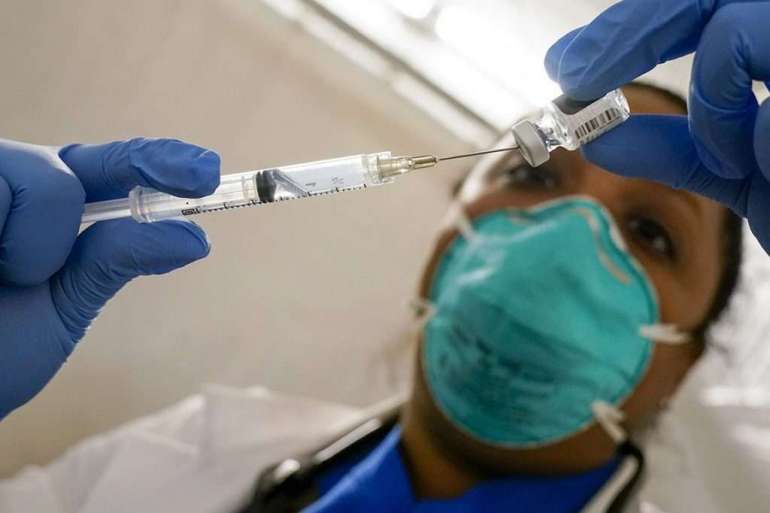Troubling CDC vaccine data convinced Biden team to back booster shots

That data — which is set to be made public later this week — brought a swift end to a debate over when to administer boosters that has raged within the administration for months, and spurred the buildout of a plan for distributing the additional shots in a matter of weeks.
The Biden administration is now expected to formally announce its strategy within days, following a series of meetings throughout the weekend focused on concerns that Americans’ immunity against Covid-19 was not only fading, but dropping faster than anticipated in the face of the Delta variant.
Officials are still finalizing the details of the booster plan, and the government is not expected to begin offering third shots from Pfizer and Moderna until mid-September at the earliest. The Food and Drug Administration must first authorize the booster shots, and the CDC will need to formally recommend that people get them eight months after completing their initial vaccination round.
But the move represents an acceleration of a process that had proceeded cautiously, as officials hunted for clear signs that the vaccines’ immunity was waning.
The plan for now doesn’t call for boosters for recipients of the single-dose Johnson & Johnson vaccine. Federal officials are awaiting results of a study by the drugmaker on the effectiveness of administering two J&J doses.
The White House and the Department of Health and Human Services did not respond to requests for comment.
Inside the administration, some health officials had long argued that boosters would be needed as soon as fall, and should be given pre-emptively to ensure that people’s protection against Covid-19 remained high.
Others, including officials at the CDC, were more skeptical, contending the data did not yet show a need for boosters — and questioning whether the administration should wait until it became clear that protection from severe infections that could cause hospitalization or death was wearing off.
Yet top health officials coalesced around the more immediate need amid growing indications that the Delta variant could significantly set back the nation’s progress against the pandemic.
Data from Israel had found that the Pfizer vaccine’s ability to prevent severe disease and among older people first vaccinated in January had declined over time. And a study released last week by the Mayo Clinic found the effectiveness of the Pfizer vaccine against mild infections had fallen — though it was still performing well in preventing hospitalization.
Against that backdrop, it was the CDC’s own similar findings that proved the deciding factor. The agency’s study gave officials a high-resolution view of the extent to which protection was declining for different groups.
The administration’s emerging booster plan will rely on roughly 100 million doses of Pfizer and Moderna’s vaccines that are available immediately, according to two senior officials with knowledge of the situation. The government has contracted for an additional 400 million shots to be distributed as needed following the announcement, they added.
Administration officials downplayed the decision to exclude for now of J&J vaccine recipients, noting that vaccine was not authorized until late February and that recipients would not be eligible for a booster until October.
Still, the decision to forge ahead with third shots of Pfizer and Moderna is likely to invite backlash both at home and abroad. The World Health Organization has urged developed countries to hold off on booster shots over fears that a new round of mass vaccinations will make it even more difficult for lower-income countries to get access to initial supplies of the vaccines.
“Administration of booster doses will exacerbate inequities by driving up demand and consuming scarce supply while priority populations in some countries, or subnational settings, have not yet received a primary vaccination series,” the WHO said in an Aug. 10 statement.
Biden officials are confident they can fulfill their vows to be an “arsenal of vaccines” for the world while sending Americans back for more because of their surplus of shots and expectation that many more are on the way, an administration official said.
It would also be virtually impossible to stop people from seeking boosters if drug makers apply for approval and they’re deemed effective — an FDA determination that cannot take into account factors such as worldwide need.
But some health experts worried the decision to offer boosters would set a precedent for other developed countries around the world, and do comparatively little to help snuff out the pandemic.
“It’s really inequitable and it’s not in our interest because you’re leaving much of the world unprotected, where you’re going to have the emergence of other variants,” said Céline Gounder, an infectious disease specialist who served on the Biden transition’s Covid-19 advisory board. “I feel like this is very short-term thinking. It’s very individualistic, nationalist thinking.”
The growing concern about the Delta-fueled resurgence appears to have overridden those concerns for now, after daily new cases hit highs not seen since February.
Health officials have closely watched the nation’s case numbers for signs that the increase might peter out, similar to the sudden drop-off in infections seen in the U.K.
But that hope has dimmed with each passing day, especially amid a spate of reports of outbreaks among children and teachers as schools reopen in some states. Now, with nearly 30 percent of the country still unvaccinated and growing evidence of Covid-19’s transmissibility, administration officials are opting to take action however they can to try to blunt what many fear will be a brutal autumn.
“It’s a combination of Delta being a particularly nasty variant that’s very contagious and the fact that, unsurprisingly, vaccine protection does gradually wane over time,” National Institute of Health Director Francis Collins said Tuesday on the Hugh Hewitt Show. “We don’t want to wait until it’s like, oh, too late.”